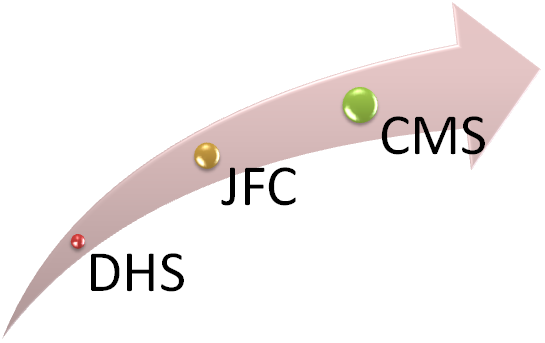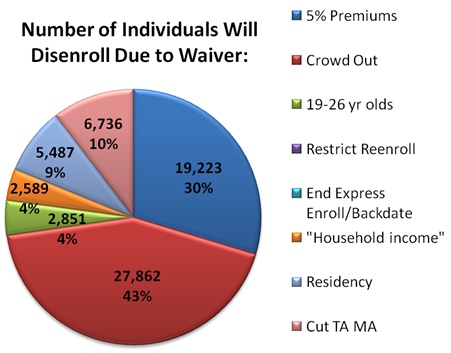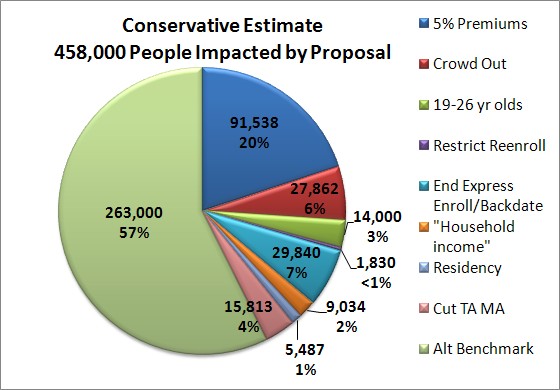DHS should go back to the drawing board on Medicaid
State's plan for dealing with a $500 million budget hole would put too many of the poor at risk.
Nov. 19, 2011 |
Dennis Smith bears a striking resemblance to a certain green fuzzy creature who steals a certain December holiday.
That's what his critics, including many Democrats, seem to think.
According to them, the secretary of Wisconsin's Department of Health Services is booting thousands of kids to the curb of the health care system on account of a radically conservative ideology.
We don't think Smith or his top deputy, Kitty Rhoades, are coldblooded. They are, in fact, levelheaded. Smith, in particular, has deep experience in the Medicaid system - he ran it under former President George W. Bush. But while we think Smith has come up with an interesting proposal for reining in escalating costs in the state's health care programs for the poor, we also think it is flawed.
There is no doubt his plan is innovative and an improvement over how some states have handled ballooning Medicaid costs. But his ideas risk hurting too many of Wisconsin's poor - especially kids - and we can't support his plan as written.
To enact his changes, DHS needs a waiver from the federal government's so-called "maintenance of effort," required under the federal health care reform law. We urge the federal Department of Health and Human Services to hold off on that waiver until the state does more to ensure that fewer of the poor are affected.
Smith and his counterparts across the country are staring at deep holes in their Medicaid budgets. The recession brought more people into the programs as people lost jobs, health benefits or both, and states, such as
Wisconsin, expanded eligibility. Federal stimulus money backfilled the holes last year, but those funds have run dry and there will be no more federal bailouts.
In Wisconsin, the Medicaid rolls have increased at a rate nearly 10 times the rate of population growth. The state has an estimated $554 million deficit in state and federal money through
June 2013 in Medicaid health programs, programs that now cover one in five Wisconsin residents.
But fewer people likely will be covered in the future, whether the state gets a federal waiver or not. According to the nonpartisan Legislative Fiscal Bureau, 65,000 people, nearly half of them kids, would either leave the programs or be turned out under the changes Smith is proposing. If Wisconsin doesn't get federal approval by
Dec. 31 - and that looks like a tall order given the politics involved - the state would be free on its own under current rules to drop 53,000 adults by increasing elgibility requirements.
Smith's plan would take a number of steps to tighten standards, including sizable increases in premiums. In some cases, premiums would increase almost tenfold. The proposals also include moving 263,000 people in BadgerCare Plus into a lower cost plan with fewer benefits. Both adults and kids could be dropped from the program for one year if they failed to pay their monthly premium without a valid excuse.
The state also would disqualify from Badger Care Plus some who have access to employer-sponsored insurance plans. The department estimates that nearly 28,000 people no longer would be eligible for BadgerCare Plus after enactment of this particular rule change, including more than 11,000 kids.
The administration of Gov. Scott Walker argues that many of those families will find a way to cover their kids.
We think that's a fantasy. It's far more likely that families on the edge of poverty will forego insurance in order to pay the rent or put food on the table.
And that means that some of them will end up using emergency room care - some of the most expensive medical care in the business - when they or their kids get sick.
The Smith plan may save taxpayers money now, but it's built on an illusory foundation. Those same taxpayers will pay for the more expensive care of the poor through their health insurance premiums as providers shift the costs onto those who can pay.
We urge HHS secretary Kathleen Sebelius to deny the state's request for a waiver until the state amends its proposal so that fewer of the poor - especially kids - are affected. This is a special concern for Milwaukee's poor, a city with one of the worst rates of infant mortality in the country. Poor mothers need good prenatal care; fewer of them may get it under this proposal.
We give Smith points for creativity, but we think his plan is likely to be overly harsh on the poor. If we're wrong, he can come to
Milwaukee anytime for a heaping helping of
roast beast on us. We'll even carve it for him.
***
BY THE NUMBERS
64,748: Number of people likely to drop from Medicaid rolls as a result of state's proposal.
29,120: Number of children among that number.
554,000,000: Depth (in dollars) of Medicaid budget hole.








 ce Committee member Sen. Robert Jauch called them, "innocent hostages" caught in the middle of this DHS request and CMS review process and face BadgerCare program terminations if an approved waiver is not in place by Dec. 31, 2011. The state budget says that if the waiver isn’t approved by Dec. 31, 2011, those parents on BadgerCare Plus and adults on the Core Plan above 133% FPL will be dropped. Wisconsin Democratic legislators have asked Secretary Sebelius to help protect the 53,000 parents and adults on BadgerCare.
ce Committee member Sen. Robert Jauch called them, "innocent hostages" caught in the middle of this DHS request and CMS review process and face BadgerCare program terminations if an approved waiver is not in place by Dec. 31, 2011. The state budget says that if the waiver isn’t approved by Dec. 31, 2011, those parents on BadgerCare Plus and adults on the Core Plan above 133% FPL will be dropped. Wisconsin Democratic legislators have asked Secretary Sebelius to help protect the 53,000 parents and adults on BadgerCare.
 The Bureau representative continued, saying that premiums were different than residency requirement, where the table shows that there will be disenrollment for those that aren’t technically eligible. After this clarification, Smith said “we’re just simply carrying over federal policy.” Rep. Mason was not willing to let the point of his question go. He stated, “At the end of the day, 65,000 people won’t be in BadgerCare.” Smith quickly replied, “Some will have insurance.” Yes, and some will have a source of care, too...the emergency room.
The Bureau representative continued, saying that premiums were different than residency requirement, where the table shows that there will be disenrollment for those that aren’t technically eligible. After this clarification, Smith said “we’re just simply carrying over federal policy.” Rep. Mason was not willing to let the point of his question go. He stated, “At the end of the day, 65,000 people won’t be in BadgerCare.” Smith quickly replied, “Some will have insurance.” Yes, and some will have a source of care, too...the emergency room.
 There have been cherished moments in Wisconsin history, when Thompson was governor and made a commitment to be a brother’s keeper….Now, there is a callous disregard and now we’re a brother’s keeper—unless you’re on BadgerCare.”
There have been cherished moments in Wisconsin history, when Thompson was governor and made a commitment to be a brother’s keeper….Now, there is a callous disregard and now we’re a brother’s keeper—unless you’re on BadgerCare.”